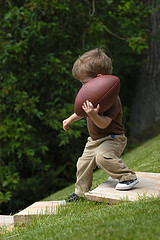Because I’m an advocate for increased emphasis on academics, there are some groups that try to drag me into their “sports get too much attention” message. While I might agree with the basic tenet of their argument, there are three reasons why I won’t get caught up in that fight.
First, it’s a losing battle. You may rail all you like about our nation’s obsession with sports, but it’s not going away. And while I agree it’s often over the top, I’m still a sports fan myself, even a baseball season ticket holder. You must pick your battles, and America isn’t abandoning its love of athletics.
Second, I want kids to participate in – and appreciate – sports. When you make too big of a deal about our nation’s infatuation with athletes, you risk turning a child off to sports entirely, which would be a mistake. Team sports and other extracurricular activities, despite their drawbacks and failings, offer valuable life lessons that students can apply in other areas of their lives, such as discipline and time management. And do we even need to mention the health issues that plague an already sedentary population? I want kids running and playing.
But the third reason is critical, and lies at the core of my non-profit foundation’s mission. Playing the two sides – athletics and academics – against each other causes too many young people to feel as if they must choose between the two, and that’s just wrong.
I’d much prefer that we encourage students to excel in both areas. Today we seem to automatically separate kids into two groups, the jocks and the brains. How preposterous! For decades our country spawned countless student-athletes who kicked butt on the field and in the classroom. We produced Academic All-Americans who represented our country on the athletic field, and then went on to incredible business careers.
Byron “Whizzer” White was one of those young stars, earning honors at the University of Colorado and parlaying that into a successful NFL career. Oh, by the way, he also won a Rhodes Scholarship to Oxford, and eventually became a United States Supreme Court Justice.
More recently, former Florida State football player Myron Rolle was good enough to be drafted by the NFL, but he also completed his degree in less than three years with a 3.75 GPA. He postponed his professional football career after being selected as a Rhodes Scholar to study at Oxford. On top of that, he helped to create not one, but two foundations that work with kids: one aimed at fighting obesity, and the Emerging Scholars Project.
You rarely hear stories like that anymore.
It’s all about balance. For many young people the years between six and eighteen are crammed with sports activities: practice four or more times each week, weekends that are wall-to-wall tournaments, and even summer sports camps. Sure, there are some academic retreats and special programs, but when you add up the sheer number of hours and days committed to each, it’s not even close.
The sad truth is that, for the vast majority of young people, their participation in team sports pretty much ends when they leave high school, while their reliance on the fruits of their education will remain with them for the rest of their lives. The monstrous imbalance between athletic and academic devotion becomes damaging down the road.
True, there are some parents who are determined to raise a professional athlete, but most simply cart their kids around to practices and games because . . . well, it’s what we do in this country, right? It’s the parent’s responsibility to step back and determine if their child is putting an appropriate amount of time and effort into what will actually pay off in the long run: their education.
Cheers to the students who strive to excel in athletics and academics. They’ll reap the benefits of the discipline that they learn in team sports, and they’ll find that their educational efforts pay off as they make their way through the adult working world. Asking a child to choose between them is both unnecessary and unhealthy.
Dom Testa is an author, speaker, morning radio show host, and has kept a ficus tree alive for twenty two years. He’s also the founder and president of The Big Brain Club, a non-profit foundation that helps young people recognize that Smart Is Cool. More info at www.DomTesta.com.
Earnest Parenting: help for parents who want a true balance for their children.



Excellent points. In our small town, it feels like if your child isn’t on all of the teams, you are less. if your child isn’t on the Varisty, you are not as less. Does that make sense? We haven’t lived here forever either, so even though we have been here five years, we are still “new”.
Carl, I’m sorry you’re encountering that attitude. We live in a small town and I haven’t experienced that. But I’m new to the public school scene, so I can’t say for sure that dynamic isn’t in place here.